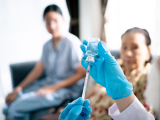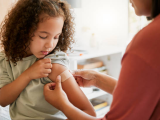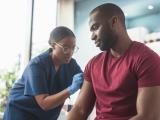Dec 16, 2009 (CIDRAP News) – Despite a dip in cases, H1N1 influenza has not gone away and could resurge, making continued vaccination critical, government and private health officials said today.
Speaking on a webcast for health care providers conducted by the Department of Heath and Human Services (HHS), the experts urged healthcare workers to take the vaccine themselves and to continue to push it out to patients.
"We know from the past there could be increases after the holidays," said Dr. Anne Schuchat, director of the National Center for Immunization and Respiratory Diseases at the Centers for Disease Control and Prevention (CDC).
Continuing to vaccinate will reduce the chances that H1N1 can return in a destructive third wave, agreed Dr. Nicole Lurie, HHS's assistant secretary for preparedness and response. "We don't know what is going to happen," she said. "Although the virus is on the downswing now, I don't think any of us right now think it is going to go away."
Health officials are concerned that healthcare workers continue to be vaccinated, especially now that rules for who may receive the vaccine have loosened in what Schuchat said are roughly half the states. Health workers' example exerts an important influence, said Dr. Nancy Nielsen, immediate past president of the American Medical Association: "We have a responsibility not only to take care of ourselves, but to be role models for those we take care of."
Federal officials remain concerned that some high-risk populations have not been vaccinated at high-enough rates, including racial and ethnic minorities, pregnant women and young children.
"We have seen almost 10,000 deaths from the flu, and many of those were children," said newly sworn-in US Surgeon General Dr. Regina Benjamin. "As a parent, you wouldn't want your child to be one of those children. These were healthy kids who were dying."
Questions submitted by email during the webcast demonstrated that members of the public remain confused about recommendations for vaccination against H1N1. Viewers from around the United States asked about when during pregnancy to take the H1N1 shot, whether a child turning 10 requires one shot or two, and whether people who had a respiratory illness in the autumn should still seek H1N1 vaccine.
(The answers: Anytime during pregnancy; if the child gets one shot while 9 and turns 10 before the second shot, that one shot is efficient; and yes, get vaccinated, because other organisms cause flu-like symptoms and thus that illness may not have conferred immunity.)
While acknowledging the cost of responding to the pandemic, and the pain to families who have had loved ones fall ill or die, the officials said H1N1 has had positive effects. They pointed to greater uptake of seasonal flu vaccine, establishment of new school-based clinics, trials of new treatments, greater acknowledgement of the need for sick leave, and overall increased awareness of flu as a serious health problem requiring a coordinated public and private response.
See also:
Dec 16 HHS webcast for healthcare providers
http://www.flu.gov/live/index.html


















